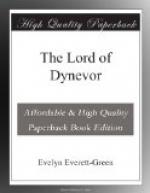The young man saw the attack; but his weapon was buried in the body of the cub, and he had no time to disengage it. Turning with a sharp cry of terror, he attempted to fly up the rocky path; but the beast was upon him. She made a wild dash and fastened upon his back, her fangs crushing one shoulder and her hot breath seeming to scorch his cheek. With a wild yell of agony and terror Raoul threw himself face downwards upon the ground, whilst his cry was shrilly echoed by the girls — all but Arthyn, who stood rigidly as if turned to stone, a strange, fierce light blazing in her eyes.
But help was close at hand. Wendot had seen the spring, and had followed close upon the charge of the maddened brute. Flinging himself fearlessly upon the struggling pair, he plunged his knife into the neck of the wolf, causing her to relax her hold of her first foe and turn upon him. Had he stabbed her to the heart she might have inflicted worse injury upon Raoul in her mortal struggle; as it was, there was fierce fight left in her still. But Wendot was kneeling upon the wildly struggling body with all his strength, and had locked his hands fast round her throat.
“Quick, Llewelyn — the knife!” he cried, and his brother was beside him in an instant.
The merciful death stroke was given, and the three youths rose from their crouching posture and looked each other in the eyes, whilst the wolf lay still and dead by the side of her cub.
“Methinks we have had something too much of Welsh wolves,” was the only comment of Raoul, as he joined the royal party without a word to the brothers who had saved his life.
CHAPTER VII. THE KING’S JUDGMENT.
The great King Edward had been sitting enthroned in the state apartment of the castle, receiving the homage of those amongst the Welsh lords and chieftains who had been summoned to pay their homage to him and had obeyed this summons.
It was an imposing sight, and one not likely to be forgotten by any who witnessed it for the first time. The courageous but gentle Queen Eleanor, who was seldom absent from her lord’s side be the times peaceful or warlike, was seated beside him for the ceremony, with her two elder daughters beside her. The young Alphonso stood at the right hand of the king, his face bright with interest and sympathy; and if ever the act of homage seemed to be paid with effort by some rugged chieftain, or he saw a look of gloom or pain upon the face of such a one, he was ever ready with some graceful speech or small act of courtesy, which generally acted like a charm. And the father regarded his son with a fond pride, and let him take his own way with these haughty, untamable spirits, feeling perhaps that the tact of the royal boy would do more to conciliate and win hearts than any word or deed of his own.




